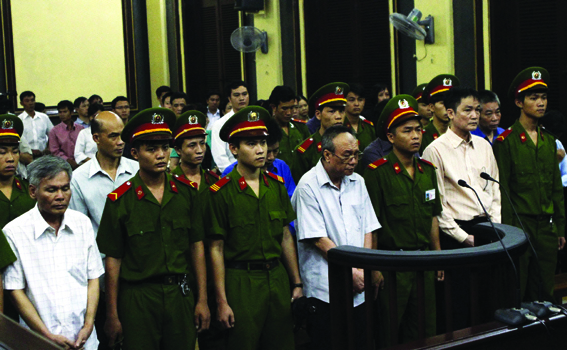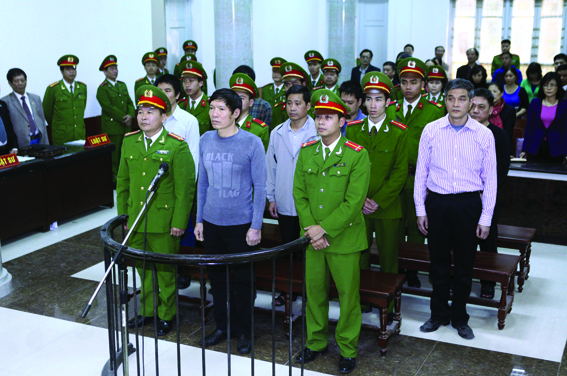Dang Van Thuc and Le Xuan Luc
Hanoi Procuratorate University
After ratifying the 2000 United Nations Convention against Transnational Organized Crime (the Convention), the Prime Minister last year issued Decision No. 605/QD-TTg approving the plan on implementation of the Convention and the Protocol to Prevent, Suppress and Punish Trafficking in Persons, especially Women and Children. The plan says: “To determine the contents and roadmap of translation into a domestic law of the provisions of the UN Convention against Transnational Organized Crime and the Protocol on preventing, punishing and suppressing human trafficking crime, especially of women and children, contributing to the completion of institutions, improving and promoting international cooperation in the prevention and combat of transnational organized crime…”
This article aims to point out consistencies and disparities between the provisions of Vietnam’s criminal law and those of the Convention regarding criminal organizations, and proposes amendments to the relevant provisions of the current Penal Code.
Definition and legal characteristics of criminal organizations
Definition of criminal organization in the Convention
So far, countries around the world have not yet agreed on a definition of the crime of terrorism as well as international terrorism but have reached consensus on the definition of organized crime. Though the Convention does not provide a specific definition of transnational organized crime, it has clear provisions on organized criminal groups and the transnational nature of a criminal act.
Clause a, Article 2 of the Convention stipulates: “An organized criminal group is a structured group of three or more persons, existing for a period of time and acting in concert with the aim of committing at least one or more serious crimes or offences established in accordance with this Convention in order to obtain, directly or indirectly, a financial or other material benefit.”
Clause c, Article 2 defines: “A structured group means a group that was not randomly formed to commit an instant offense and the roles of the group’s members are not necessarily clearly defined, the relationships among the members are maintained or the structure of the group is developed.”
The above provisions on organized crime clearly describe the criminological characteristics of this type of crime. The Convention introduces a new concept of organized crime that addresses the inconsistency among the existing laws of different countries and quantifies the number of a criminal group’s members. This concept helps reach a uniform understanding of organized crime and facilitates the legislative, executive and judiciary activities in the member states. All activities of organized criminal groups are, directly or indirectly, driven by material benefits. Crimes often committed by these organizations include murder, robbery, human trafficking, drug trafficking, trading of firearms, illegal transportation of migrants, etc.
Definition of criminal organization in Vietnam’s criminology
In Vietnam, a number of criminal gangs have been recently formed and operating as criminal organizations. These criminal gangs have committed many serious crimes such as illegal bouncer service, drug trafficking and dealing, and organized gambling. Unfortunately, Vietnam’s current Penal Code does not provide a definition of criminal organizations.
The existing jurisprudential viewpoints on criminal organization have pointed out some typical characteristics of criminal organization, i.e., it is an organization or group of closely connected persons formed to commit one or more than one serious or particularly serious crime for the purpose of obtaining illicit material benefits.
To have a proper definition of criminal organization, we are of the opinion that we should avoid both of the following trends:
- The first one defines criminal organization too broadly which might lead to an excessive number of cases to be punished and create a negative image of a society with too many criminal organizations.
- The second one assumes that it is unnecessary to have a definition of criminal organization in the Penal Code as it already has provisions on organized crime.
In our opinion, criminal organization should be defined as follows: A criminal organization is a group of at least three persons closely coalesced together, operating on the command-obedience relationship, with clearly defined roles and relationships of members, formed and existing for a given period of time for the purpose of committing one or more than one serious or particularly serious crime to obtain certain financial or material benefits.
From the above-proposed definition of criminal organization and relevant definitions in the Convention, we can draw some legal characteristics of criminal organization
Firstly, a criminal organization is a group of at least three persons. In addition to the state of close coalition and collusion, the number of a group’s members is the primary element to be taken into consideration. This characteristic helps distinguish a criminal organization from an organized crime prescribed in Clause 3, Article 20 of the Penal Code. Accordingly, organized crime involves complicity between closely colluded persons to commit a crime. Complicity is where two or more persons intentionally and jointly commit a crime. An organized crime only needs two or more persons who closely collude to commit a crime. Whereas, for a criminal organization, the number of its members, which must be at least three, demonstrates the close coalition and collusion as well as the division of work among its members.
Secondly, a criminal organization is based on close collusion and operates on the command-obedience relationship, with clearly defined roles and relationships of the group’s members. This characteristic reflects the organized nature of the group because division of labor is a basic feature of any organization. All criminal organizations that have been brought to light in Vietnam have this feature. A criminal organization always has a commander or leader, who is the founder or a co-founder of the criminal organization and directs its operation. This shows that a criminal group, which is composed of three persons or more but operates on an inherent relationship instead of the command-obedience relationship and has no work division among its members, is merely a group of persons who voluntarily join one another in committing a crime and cannot become a criminal organization.
Thirdly, a criminal organization must be formed and exist for a given period of time for the purpose of committing one or more than one serious or particularly serious crime. This characteristic demonstrates the professionalism and purposefulness of criminal organizations. It also reflects the common practice of criminal organizations around the world. According to the Convention, an organized criminal group must exist for a given period of time and its members must act in concert to commit one or more serious crimes. In other words, criminal organizations are not randomly formed to commit a spontaneous offense. Crimes committed by criminal organizations must be serious or particularly serious ones. Therefore, a criminal group that is randomly formed and immediately disbanded after committing a crime or is formed to commit a less serious crime is not regarded as a criminal organization.
Fourthly, a criminal organization is formed and operates for the purpose of committing crimes to obtain certain financial and material benefits. This characteristic shows that criminal organizations are often involved in “lucrative” crimes with high illicit revenue such as drug trafficking, human trafficking, organized gambling and prostitution. Since they can acquire great financial benefits, criminal organizations need to legitimize proceeds of crime, especially through money laundering. Thus, combating criminal organizations requires cooperation from different agencies and includes combating money laundering to legitimize proceeds of crime.

Drug-dealing gang leader Nguyen Thi Bich Ngoc at the appellate court hearing
in Bac Giangprovince __Photo: Xuan Tung/VNA
Proposed amendments to regulations on criminal organizations and relevant provisions of the Penal Code
As analyzed above, a clear definition of criminal organization in the Penal Code would play an important role in handling persons involved in organized criminal groups and punishing criminal organizations.
As per the current Penal Code, the participation in an organized criminal group by a person who has neither yet committed nor abetted others in committing a crime, except the case of participation in an organization to subvert the people’s administration (prescribed in Article 79 of the Penal Code), does not constitute a crime. Vietnam’s criminal law only provides the institution of complicity. Organizers, executors, instigators and abettors are all accomplices. This Article also prescribes a form of high-level complicity which is complicity with close collusion among persons who jointly commit a crime.
At present, complicity can also be applied to punish an act of a person who knows well the purpose or joint criminal acts of a criminal organization or the intention of a criminal organization in committing a crime under investigation, but still participates in committing criminal acts or other activities of that criminal organization while knowing that his/her participation would help that criminal organization achieve its criminal purposes.
To defend the national security and prevent and combat local and foreign criminal organizations operating in Vietnam, and to fulfill the responsibility of a state that has ratified the Convention, we suggest some amendments and supplements to the provisions of the Penal Code concerning criminal organizations and involvement in organized criminal groups:
Firstly, the definition of criminal organization should be included in the General Part of the Penal Code following the definition of complicity. This definition should read as follows:
1. A criminal organization is a group of at least three persons in close coalition and collusion and operating on the command-obedience relationship, with clearly defined roles and relationships of the group’s members, formed and existing for a given period of time for the purpose of committing one or more than one serious or particularly serious crime to obtain certain financial or material benefits.
2. Persons who found or participate in criminal organizations shall bear criminal liability for the act of founding or participating in criminal organizations as prescribed in Article … in the Part on Crimes of this Code.”
Secondly, the founding of or participation in a criminal organization should be distinguished from the act of preparing to commit a crime in a particular case. This is clearly demonstrated in the laws of several countries by confirming that handling the act of founding or participating in criminal organizations is completely separated from handling a particular crime (including also participating in the stage of preparing to commit a crime and uncompleted commission of a crime). The ground for criminal punishment is the participation in criminal organizations. Therefore, a provision should be added to the Penal Code, which reads: “Offenders of criminal organizations shall bear criminal liability for founding or participating in these criminal organizations and for particular crimes which they have participated in committing as members of these criminal organizations.”
Thirdly, the circumstance that “the offender is a member of a criminal organization” should be added as one of the circumstances aggravating the criminal liability prescribed in Article 48 of the Penal Code for the reason that criminal organizations commit offenses which are more dangerous to the society than organized crimes. This provision will be important for handling offenders who are members of criminal organizations.
Fourthly, “committing an organized crime” is in essence a special type of “complicity” and the use of this expression is misleading and illogical. Therefore, the expression “organized complicity” should be used instead of “committing an organized crime” in Clause 3, Article 20 of the Penal Code. This will help unify the understanding of the concepts “complicity”, “organized complicity”, and “criminal organization”. In other words, “criminal organizations” that commit crimes by means of “organized complicity” constitute a special type of “complicity”. However, not every crime committed by means of “organized complicity” can be perceived as one committed by a “criminal organization.”
The Penal Code should also establish as a crime the founding of and participation in criminal organizations by including a new article in its Part on Crimes by referring to the provisions of the Convention or providing in a more appropriate way. We suggest the following:
“Persons who know well the purpose and criminal activities of a criminal organization or know well the intention of a criminal organization to commit crimes, but still participate in criminal acts of such criminal organization or join hands in committing other acts of such criminal organization, knowing that their participation would help realize the criminal purpose, will be …”
More specifically, this suggested provision on criminal liability for founding or participating in criminal organizations should be included in the Penal Code’s Chapter XIX on crimes infringing upon public safety and public order.
In addition, the circumstance “committing the crime in an organized manner” is currently used as an aggravating circumstance for a number of crimes in the Part on Crimes of the Penal Code. In case offenders are members of criminal organizations, the danger of their offenses would be much greater. It is, therefore, necessary to consider adding a new aggravating circumstance that “Offenders are members of criminal organizations” in a number of articles in this Part of the Penal Code.-



